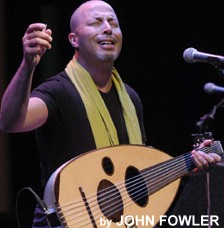Featured artist: DHAFER YOUSSEF

[John
Kelman is the Senior Editor at
All About Jazz. Throughout the
year
he reports on jazz festivals throughout the world
including one of his favourites, the Montreal
Jazz Festival, that featured Dhaser Youssef.]
________________
Tunisian-born/
Paris-based singer/oudist Dhafer Youssef boasts a career that
has been gradually building up steam over the past few years by
incorporating the musical culture of his birthplace with everything
from the Norwegian Nu Jazz aesthetic to contemporary classical
music. Appearing on albums including Norwegian guitarist Eivind
Aarset’s Connected (Jazzland, 2004) and fellow
Parisian/guitarist Nguyên Lê’s Homescape
(ACT, 2006), his own discography reveals a forward-thinking artist
who clearly believes that the undeniable evidence of diverse cultures
coming together in music means hope for the ideological and political
clashes so prevalent in a modern dysfunctional world.
As virtuosic
as other well-known oudists including Rabih Abou-Khalil and Anouar
Brahem, Youssef has taken a different path by processing his lute-like
instrument electronically, and working with samples and loops
similar to guitarist Bill Frisell’s loop-heavy performance.
But unlike Frisell, who was working with a conventional configuration
of bass and drums, Youssef was accompanied by tablaist Jatinda
Thakur and The Divine Shadows Strings, performing material largely
culled from Divine Shadows (Jazzland, 2006), which also
featured a host of Scandinavian guests, including Aarset, percussionist
Marilyn Mazur and sampler Jan Bang.
The Divine
Strings -- first violinist Joanna Lewis, second violinist Ivana
Pristasova, violist Petra Ackermann and cellist Melissa Coleman,
all of whom, like Thakur, reside in Vienna, Austria and are evidence
of that city’s cosmopolitan nature -- were more than simply
accompanists for Youssef’s warm oud and powerful voice.
Instead, the quartet interacted liberally with Youssef -- at times
playing contrapuntal devil’s advocate, elsewhere working
in strong unison. Demonstrating drama and nuanced subtlety, one
of the hundred-minute performance’s finest moments was Youssef’s
“Cantus Lamentus,” dedicated to Arvo Pärt. With
its long, droning notes and tranquil tone, the work recalled the
Estonian composer’s tintinnabuli-styled Alina (ECM,
1999), but with Youssef’s plaintive vocal, the piece departed
from the near-ambient nature of its source for more dynamic territory.
It may
not be jazz by conventional definition, but improvisation was
easy to find, wrapped in clear form. Youssef and Thakur, in particular,
interacted throughout the performance, feeding off each other's
energy while never overpowering the strings. At one point Thakur’s
percussive but uncharacteristically gentle konnakol singing acted
as a contrast to Youssef’s more passionate delivery, ultimately
coming together in cross-cultural harmony.
A well-deserved
standing ovation at the show’s end brought the group back
for a piece that featured an innovative solo from Coleman, who
explored not only the harmonic and dynamic range of her instrument,
but its textural potential as well. Always an expressive instrument,
it responded especially well to Coleman, who derived breathy,
flute-like sounds from it that she would contrast with harsher
bowing. Youssef, clearly as captivated by the solo as the audience
was, would not let her finish when she gave her cue for the rest
of the group to enter, instead pushing her to continue. When the
group did finally enter, Lewis delivered a violin solo that, while
honouring the conventions of the song’s structure, was equally
passionate and exploratory, additional evidence of so many artists
who are refusing to be limited by traditionally accepted boundaries
of style or genre.
Breaking
boundaries is, in fact, what Youssef is all about. By combining
Middle Eastern-informed music with technology, a classical string
quartet and tablas, Youssef demonstrated the power of music to
break down walls. His singing -- rarely articulating words but,
instead, more purely emotional vocal sounds -- was both mournful
and hopeful. Words simply weren’t necessary to convey his
meanings; the emotions were never less than crystal clear. If
it’s possible to assimilate so many diverse elements into
a new whole that still reflects the distinct cultures from which
the end result is sourced, perhaps there’s room for optimism
elsewhere as well.